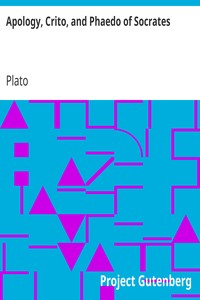| Author |
Plato, 428? BCE-348? BCE |
| Commentator |
Brooks, Edward, 1831-1912 |
| Translator |
Cary, Henry, 1804-1870 |
| Title |
Apology, Crito, and Phaedo of Socrates
|
| Note |
Reading ease score: 68.6 (8th & 9th grade). Neither easy nor difficult to read.
|
| Credits |
Produced by Ted Garvin, Jussi Kukkonen and the Online Distributed
Proofreading Team.
|
| Summary |
"Apology, Crito, and Phaedo of Socrates" by Plato is a collection of philosophical dialogues written in the early 4th century BC. This significant work captures the essence of Socratic thought through three primary discussions surrounding the trial, moral obligations, and the nature of the soul and immortality, focusing on the key character of Socrates, who defies conventional norms as he confronts his death. At the start of the text, the introduction lays the groundwork for understanding the historical context of Plato's works and highlights his importance in philosophy. The opening dialogue, "Apology," details Socrates’ defense during his trial, where he stands resolutely against accusations of impiety and corruption of youth. Socrates engages with the Athenian jury using logic and rhetorical questioning, stressing the value of wisdom over popular opinion and laying the groundwork for his philosophical principles. The beginning shows Socrates contemplating his wisdom in light of the oracle's declaration, establishing his commitment to the pursuit of truth and justice, setting the stage for the deeper themes explored in the subsequent dialogues. (This is an automatically generated summary.)
|
| Language |
English |
| LoC Class |
B: Philosophy, Psychology, Religion
|
| Subject |
Socrates, 470 BC-399 BC
|
| Category |
Text |
| EBook-No. |
13726 |
| Release Date |
Oct 12, 2004 |
| Most Recently Updated |
Dec 18, 2020 |
| Copyright Status |
Public domain in the USA. |
| Downloads |
1493 downloads in the last 30 days. |
|
Project Gutenberg eBooks are always free!
|

